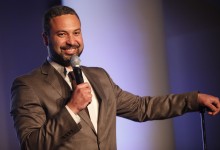

The film, which follows the California-born stand-up and actor on his comedy tour of the middle east, takes in such locations as Cairo, Dubai, Beirut and Riyadh and features a number of talented international comedians (including Britain’s own Omid Djalili). It’s an insightful and funny story of how laughter can sometimes bridge the cultural gap, and it’s a film which also makes some astute observations about tolerance and understanding without ever being heavy-handed and beating the audience over the head with it’s message.
Ahmed himself is a witty and passionate figure, full of fun and revealing anecdotes about his life and struggles to make a career for himself in comedy, and the far-reaching and positive effects the film has had so far (one of the many highlights has included him being invited to attend a dinner in the Whitehouse, hosted by President Obama).
Towards the end of October the film will be appearing at the 2nd annual Doha Tribeca Film Festival held in Quatar.
HeyUGuys: What was the impetus behind the film and tour?
Ahmed Ahmed: I really think Arabs, especially in the Middle East, are so similar to Americans in many ways, despite the religious and cultural differences. Laughter, music and food are the common denominators of the world, and these all factor heavily in the lifestyle over there. Facebook is huge in the Middle East, and there’s a population of 300 million people, and probably 75-80% of that are under the age of 30. It’s that younger generation who are coming of age and are outgrowing the older voices and looking for new ways to reach out to the world and there’s something very inspiring about that.
How did this project come together?
My business partner and I started a company called Cross-Cultural Entertainment with an aim of making movies that could shake hands with other cultures, races and genders. We were both in Florida and I told him I was due to head off to the Middle East to do a stand-up tour, and he suggested I film it. I was leaving in four days so we quickly assembled a couple of camera crew and a producer. We weren’t sure exactly what we wanted to film so we said let’s just go for the message. Let’s attempt to make a movie that illustrates the fact that Arabs and Muslins are just like all of us, hence the title.
As you began putting together the film, do you have a clear plan to the story you wanted to tell?
While we were shooting, I didn’t really have a storyline or storyboard, I just figured we needed to illustrate the fact that each country had its own feeling. We were also adamant that we didn’t want the comics involved to be the main focus either – we wanted each country we visited to be the stars of the film.
My cameramen wanted to kill me towards the end of the shoot because I was insisting that they film everything, but once we were in the editing process, it was much clearer what I was aiming for by giving each country its own identity through the shooting style.
What are your next steps in terms of promoting the film?
Well, we have distribution in the Middle East and we plan to premiere the film at the Doho Tribecca film festival in Doha, Qatar in late October. From there, the plan is we’ll launch a live show and tour around twelve countries, including many of the locations which are featured in the film. We’ve just added Nigeria and Afghanistan too.
We currently have two potential US distributors but we’re trying to figure out who, out of these, will champion the film best. It’s not about a big cash payout – we want to make sure the film gets into the right markets and the appropriate theatrical venues, DVD, video-on-demand, that sort of thing.
How has the response been so far back over in the States?
Extremely positive actually. We managed to get into the New York Tribecca film festival this year and they embraced it more than we could ever have imagined. We had a red carpet premiere and the likes of Robert DeNiro and Vince Vaughan (an old friend of Ahmed) attended.
Given your heritage and where you grow up, how have things changed since when you initially started out?
I began doing comedy when I was 24, now I’m 40 years old. In the beginning Arabs would say (adopts accent) “Ahmed, why are you doing this comedy bulsh#t, its second class. Get a real job – be a doctor, be a lawyer, get your own petrol station!” There was definitely resistance. I would reach out to the community and argue, you guys are always complaining about how Arabs and Muslims are being misrepresented in the media, why you don’t do something about it? Why don’t you fund a project? What it cost to make our film, is a shopping spree for most Arabs in the Middle East. They would argue back by saying Hollywood wasn’t a place for them.
911 changed everything. Suddenly Arabs were coming to our shows saying “makes us proud Ahmed, you’re our voice”.
Now things are starting to go my way and the struggle has been worth it. I’m a big believing in failing a hundred times before you have one piece of success. If you always succeed in everything you do I think you’d get bored and take advantage of it. If you fail a bunch of times, but have little moments of success, you appreciate it and you’re humble and you really embrace it.






